|
|
|
Sort Order |
|
|
|
Items / Page
|
|
|
|
|
|
|
| Srl | Item |
| 1 |
ID:
128946


|
|
|
|
|
| Publication |
2014.
|
| Summary/Abstract |
In this article we set out a fine-grained measure of the formal authority of intermediate subnational government for Indonesia, Malaysia, the Philippines, South Korea, and Thailand that is designed to be a flexible tool in the hands of researchers and policymakers. It improves on prior measures by providing annual estimates across ten dimensions of regional authority; it disaggregates to the level of the individual region; and it examines individual regional tiers, asymmetric regions, and regions with special arrangements. We use the measure and its elements to summarize six decades of regional governance in Southeast Asia and conclude by noting how the Regional Authority index could further the dialogue between theory and empirics in the study of decentralization and democratization.
|
|
|
|
|
|
|
|
|
|
|
|
|
|
|
|
| 2 |
ID:
129465
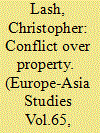

|
|
|
|
|
| Publication |
2013.
|
| Summary/Abstract |
This article examines housing conflicts during times of displacement in World War II and its aftermath. It looks specifically at the property experiences of eastern Poles in the western Polish town of Zielona Góra after forced displacement from the Soviet Union. It explores the intricate relationship between property and population displacement. By examining a micro-historical process at a time when property relations were in flux, we can investigate how displaced people negotiated spaces for themselves within a complicated set of realities. The article also adds to work done on state-society relationships in immediate post-World War II Poland.
|
|
|
|
|
|
|
|
|
|
|
|
|
|
|
|
| 3 |
ID:
133054
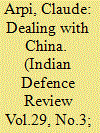

|
|
|
|
|
| Publication |
2014.
|
| Summary/Abstract |
How to deal with China has been a problem for the Indian diplomacy trom the day the People's Liberation Army entered Eastern Tibet in October 1950. South Block (both the Ministry of External Attairs and Detence) has otten been on the wrong side at history, especially during the bhai-bhai era, What can be done to give a tresh impetus to India's engagement with Beijing, while dealing in a more appropriate way with China?
|
|
|
|
|
|
|
|
|
|
|
|
|
|
|
|
| 4 |
ID:
128392
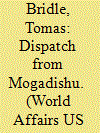

|
|
|
|
|
| Publication |
2014.
|
| Summary/Abstract |
We first saw Somalia's Parliament building from a distance, at the top of a hill overlooking Mogadishu and behind the closed arm of a checkpoint barrier. Our meeting with the speaker of Parliament was scheduled for 9:30 that morning, but the Ugandan soldiers manning the checkpoint-part of the African Union Mission in Somalia-would not let us proceed. Our names are not on the list of people with meetings in the Parliament, they told us, and they could not allow people not on that list to pass. There followed a flurry of phone calls to the aides who had arranged the meeting. But the soldiers, while polite, remained firm. They had their orders. We went back through town and tried to reach a group of MPs at another government building, but were again turned away. We consoled ourselves by noting that the soldiers' commitment to following the protocol for access to government buildings was a promising sign of their discipline and improving security conditions, but decided that it was time to give up trying to make the meeting happen that day.
|
|
|
|
|
|
|
|
|
|
|
|
|
|
|
|
| 5 |
ID:
129810
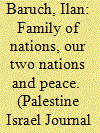

|
|
|
|
|
| Publication |
2014.
|
| Summary/Abstract |
Let me take you for a moment to the negotiations room. There, we see two players silently sitting in front of each other in focused concentration, quietly moving black or white pieces one at a time. The quiet and courteous ambience is deceiving; both are busy contemplating the consequence of defeat.
|
|
|
|
|
|
|
|
|
|
|
|
|
|
|
|
| 6 |
ID:
133577


|
|
|
|
|
| Publication |
2014.
|
| Summary/Abstract |
This article explains why contemporary African regimes choose different counter-insurgency strategies and why they tend not to be population-centric. We argue that strategies correspond to the ways in which incumbent regimes in Africa deal with different segments of political society through patronage. Incumbents seek varying levels of accommodation with rebel leaders, or try to eliminate them, according to rebels' historical position within the state. This variation reflects differences in perceived political threats posed to incumbents. We classify these threats as high, moderate or low, which are associated with counter-insurgency strategies of group control, insurgent control and insurgent elimination, respectively.
|
|
|
|
|
|
|
|
|
|
|
|
|
|
|
|
| 7 |
ID:
128434
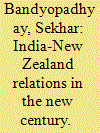

|
|
|
|
|
| Publication |
2013.
|
| Summary/Abstract |
India-New Zealand relations, which could be historically dated back to the days of the British Empire, lacked until recently in substance and were rocked by several irritants, the most important of which were the divergent views on the issue of nuclear non-proliferation. However, in last one decade or so there have been some remarkable developments in this bilateral relation, as the security interests of the two nations have converged, volume of trade increased, educational ties grew stronger and people-to-people contacts improved significantly. While there still remain some challenges, as negotiations for a Free Trade Agreement have taken longer time than expected, there are also immense possibilities. This essay looks critically at those challenges and possibilities in the relationship between two countries, which on the one hand share some historic common grounds, but are also set apart by geography as well as numerous systemic dissimilarities.
|
|
|
|
|
|
|
|
|
|
|
|
|
|
|
|
| 8 |
ID:
129108
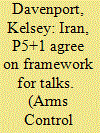

|
|
|
|
|
| Publication |
2014.
|
| Summary/Abstract |
After three days of talks in Vienna, Iran and six world powers agreed last month on a framework and timetable to guide the first four months of negotiations on a comprehensive deal on Iran's nuclear program. EU foreign policy chief Catherine Ashton, who leads the negotiating team for the six-country group known as the P5+1 (China, France, Germany, Russia, the United Kingdom, and the United States), said in a Feb. 20 statement that the parties had "identified all of the issues" to be addressed in the comprehensive agreement. An official who was briefed on the talks told Arms Control Today in a Feb. 20 e-mail that this is not a "written agenda" but an "understanding of the issues that must be covered." The official, who is from a P5+1 country, said that most of the discussions were on process but that "some substance was covered." The Feb. 18-20 meetings marked the resumption of political-level negotiations between Iran and the P5+1, following a Nov. 24 agreement on a plan of action, which laid out initial steps for each side to take and the broad parameters to guide negotiations on the comprehensive deal. (See ACT, December 2013.)
|
|
|
|
|
|
|
|
|
|
|
|
|
|
|
|
| 9 |
ID:
132523
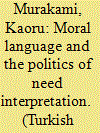

|
|
|
|
|
| Publication |
2014.
|
| Summary/Abstract |
Liberal modernists have claimed that democracy requires participation by interested parties in the politics of need interpretation. Poor people, an interested party, may lack the rational and critical language essential for the process of interpretation. This paper discusses a different perspective on the language of participation by the poor. Focusing on the everyday practices of the poor and using information collected from ethnographic research in Sultanbeyli, a low-income district in Istanbul, Turkey, it is shown how discursive power constrains the language and the manner of talking that the poor use to articulate their needs. The people in the district, "former villagers bound to the Anatolian tradition" using religious morality as a justification of their demands, successfully negotiate with administrators of social assistance programs, thus participating directly in the politics of need interpretation.
|
|
|
|
|
|
|
|
|
|
|
|
|
|
|
|
| 10 |
ID:
125112


|
|
|
|
|
| Publication |
2013.
|
| Summary/Abstract |
Using a simulated bilateral negotiation over several security issues, the authors explore how variations in the negotiation context influence reactions to a negotiating crisis. Negotiators were primed to focus on one of three aspects of the context: transaction costs, dependence, or shared identity. They were asked to respond to the crisis with a decision to reach an immediate agreement, continue negotiating, or reframe the issues. The results showed that mutual dependence (unattractive alternatives) led to reframing (turning points) whereas high transaction costs led to a preference for continuing the negotiation. Shared identity did not affect negotiators preference across alternative courses of action. Affective trust amplified the impact of dependence and transaction costs: the decision to reframe was made more often by negotiators who reported low affective trust, whereas the decision to reach immediate agreement was made more often by negotiators who reported high affective trust. High cognitive trust encouraged negotiators to continue the negotiation if they had a shared identity or if transaction costs were high. Applications were made to real-world cases and implications were developed for Relational Order theory and for further research.
|
|
|
|
|
|
|
|
|
|
|
|
|
|
|
|
| 11 |
ID:
129824
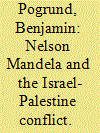

|
|
|
|
|
| Publication |
2014.
|
| Summary/Abstract |
Nelson Mandela's death set off a rush by many in the world to search for lessons in his life, and none have been more eager to do so than Israelis and Palestinians trapped in their conflict. The Importance of Balanced and Compassionate Leadership. The most obvious lesson he offers lies in the critical nature of leadership. After 27 years of imprisonment he emerged into a South Africa torn by violence as the black majority struggled for freedom against a ruling white minority. He quelled the anger among his own people and led them on the path of compromise and reconciliation. His courage and vision earned the respect and support of most whites, which allowed for the rise of a new united South Africa of democracy and non-racism.
|
|
|
|
|
|
|
|
|
|
|
|
|
|
|
|
| 12 |
ID:
129823
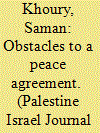

|
|
|
|
|
| Publication |
2014.
|
| Summary/Abstract |
When seriously discussing the fate of the ongoing, everlasting Palestinian-Israeli negotiation, which attempt to reach a peace agreement after decades of conflicts between two people over one historical territory, which I usually refer to as historic Palestine, but which others on the Israeli side may choose to call historic Eretz Israel, analysts are usually face with the dilemma alluded to in the title of this article.
|
|
|
|
|
|
|
|
|
|
|
|
|
|
|
|
| 13 |
ID:
129849
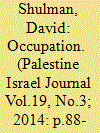

|
|
|
|
|
| Publication |
2014.
|
| Summary/Abstract |
The phrase "Obstacles to successful negotiation" has a somewhat distant ring to it. I was a little taken aback when I first read it. It's an abstraction, and far too hopeful at that. Obstacles could in theory, be removed. Maybe someday they will be. But, for now, anyone who knows the reality of what is happening on the ground in the south Herbon Hills isn't likely to think in terms of obstacles.
|
|
|
|
|
|
|
|
|
|
|
|
|
|
|
|
| 14 |
ID:
129049
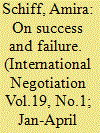

|
|
|
|
|
| Publication |
2014.
|
| Summary/Abstract |
This study presents a comparative analysis of two case studies in which attempts were made to resolve intractable ethno-national conflicts: the peace process undertaken in Aceh between the Government of Indonesia and the Free Aceh Movement, which led to the signing of the Helsinki Memorandum of Understanding (mou) ending the conflict in Aceh; and the process conducted in the Sri Lanka conflict from 2001 through 2004 between the Government of Sri Lanka and the Tamil Tigers, which failed to yield an agreement. The two peace processes will be examined using readiness theory, which focuses on the factors influencing the decision to enter into negotiations. This article also attempts to extend the hypotheses of readiness theory to explore the process of concession-making during the negotiations that took place in the two case studies. The findings indicate that the theory does contribute to understanding the dynamics of the pre-negotiation in both case studies and that applying its hypotheses may contribute to the understanding of the dynamics of the process of reaching an agreement in the Aceh process and of the factors leading to the failure of the negotiations in the Sri Lanka conflict. The analysis also gives rise to some questions that challenge readiness theory and its hypotheses - empirically and methodologically.
|
|
|
|
|
|
|
|
|
|
|
|
|
|
|
|
| 15 |
ID:
129850
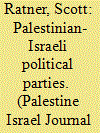

|
|
|
|
|
| Publication |
2014.
|
| Summary/Abstract |
Ever since the deterioration of the Israeli-Palestinian peace process following the outbreak of the second intifada in late 2000, it has been widely acknowledge that relations between the Israeli and Palestinian political establishments have become strained almost to the breaking point. However, far less attention has been directed to the Palestinian-Arab-Israel (PAI) parties whose transformation and pivotal role in the social and political dynamics of the conflicts should not be underestimated.
|
|
|
|
|
|
|
|
|
|
|
|
|
|
|
|
| 16 |
ID:
129804
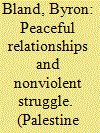

|
|
|
|
|
| Publication |
2014.
|
| Summary/Abstract |
The purpose of a peace process is to reach and implement an agreement that ushers forth peace. The belief is that negotiations will lead to a settlement that, if properly implemented, will create peace where previously only animosity and violence had existed. Acting under this paradigm international actors- the United States, the European Union, the United Nations, etc.
|
|
|
|
|
|
|
|
|
|
|
|
|
|
|
|
| 17 |
ID:
156604
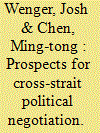

|
|
|
|
|
| Summary/Abstract |
This study adopts a pre-negotiation approach based on Robert Putnam's win-set concept to examine domestic constraints on cross-Strait political negotiation. Survey research of elite opinion in both China and Taiwan and of public opinion in Taiwan is used to estimate each side's win-set (that is, the set of political negotiation outcomes that could win majority approval domestically) during Ma Ying-jeou's second presidential term in Taiwan (2012–2016). The possibility for overlap in win-sets that could provide a zone of possible agreement and the potential for coalitions in favour of negotiation are analysed. The study finds no win-set overlap and limited potential for coalitions favouring negotiation outcomes with the least distance from overlap, concluding that domestic conditions for formal political negotiations between Beijing and Taipei are unlikely to be ripe in the near term.
|
|
|
|
|
|
|
|
|
|
|
|
|
|
|
|
| 18 |
ID:
130284
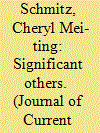

|
|
|
|
|
| Publication |
2014.
|
| Summary/Abstract |
The sense of mystery around Chinese presences in Angola impels researchers to understand not only the empirical details of economic transactions and diplomatic partnerships but also the various ways in which the actors involved make sense of a novel social, political, and economic configuration. By drawing several ethnographic portraits of the social practices and discursive strategies at play in Chinese-Angolan relations, I show how, in a context of mutual uncertainty and suspicion, appeals to "security" play a central role. Instead of viewing Chinese and Angolans as two separate groups with opposed interests and lack of communication between them, I explore how participation in a shared context generates common modes of explanation. Moreover, I propose a parallel analysis of state-level negotiations alongside everyday social encounters to consider how a political economic partnership between China and Angola is lived through the everyday negotiations of Chinese and Angolan residents in Luanda.
|
|
|
|
|
|
|
|
|
|
|
|
|
|
|
|
| 19 |
ID:
129809
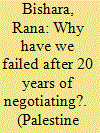

|
|
|
|
|
| Publication |
2014.
|
| Summary/Abstract |
I do not find it right to question the failure of a situation that one expected to fail from the very beginning. So, the question of "why failure?" in this case does not very much apply. We should not be surprised by failure, as certainly at the popular and factional levels. Thought many warned of the high probability of this failure, the Palestine leadership preferred to continue along this track
|
|
|
|
|
|
|
|
|
|
|
|
|
|
|
|
|
|
|
|
|